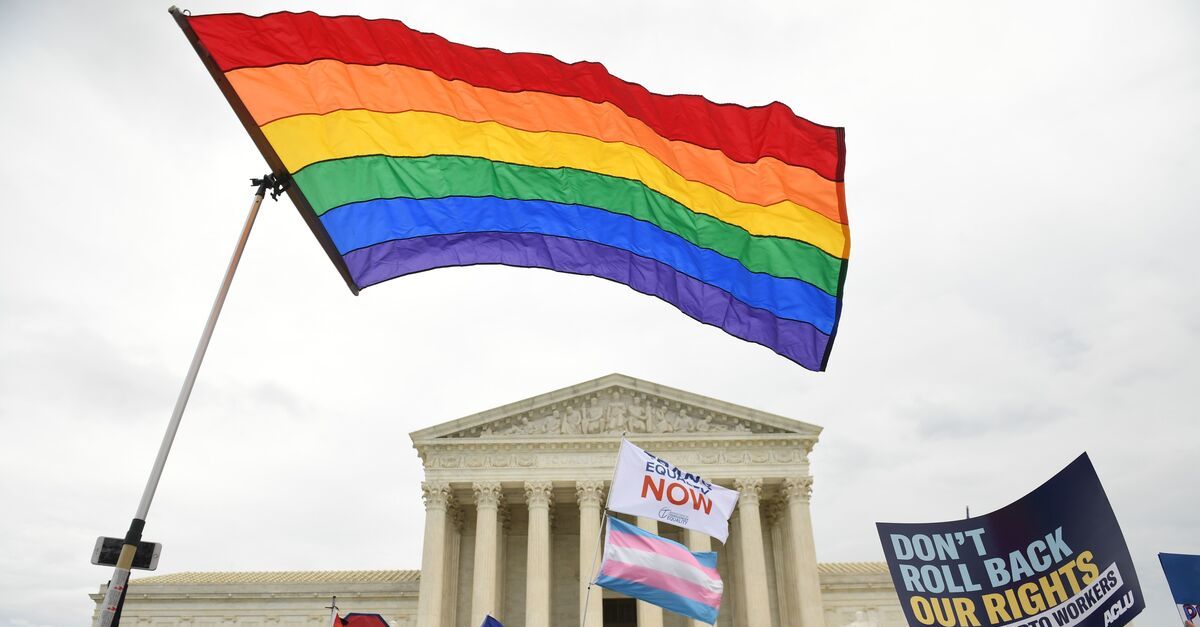
Demonstrators in favor of LGBTQ rights rally outside the U.S. Supreme Court in Washington, D.C., October 8, 2019.
The U.S. Court of Appeals for the Ninth Circuit has declined to reconsider its decision to uphold the dismissal of a case over the practice known as “conversion therapy,” teeing up a circuit split that may ultimately land the case before the U.S. Supreme Court.
Licensed marriage and family therapist Brian Tingley sued Washington state in 2021, claiming that a 2018 law that prohibited licensed mental health professionals from subjecting minors to conversion therapy violated his First Amendment rights.
The Ninth Circuit issued its decision Monday not to rehear the appeal of a Washington state therapist’s challenge to a 2018 ban on conversion therapy for minors. The appeals court had previously thrown out the therapist’s lawsuit, and its decision not to grant his request for an en banc hearing has now created a split among the federal circuit courts over how far state laws can go to protect children from potentially harmful practices designed to change their sexual orientations or gender identities.
Mental health professionals, as well as more than 20 other states, have deemed the practice dangerous to the well-being of already at-risk youth.
In August 2021, Senior U.S. District Judge Robert J. Bryan (a Ronald Reagan appointee) dismissed the case and wrote that while Tingley is acting as a counselor, “he is merely prohibited from engaging in a specific type of conduct,” but in other contexts, he remains “free to express and exercise his religious beliefs.”
Last September, a three-judge panel of the Ninth Circuit affirmed Bryan’s ruling, and once again said that treatment is conduct and not protected speech. The judges relied on the case of Pickup v. Brown, a 2014 ruling by the same court that upheld a “nearly identical” ban on conversion therapy in California.
Tingley appealed and requested a rehearing by the full circuit court, which was refused.
Four Ninth Circuit judges — Senior U.S. Circuit Judge Diarmuid O’Scannlain (also a Reagan appointee), George W. Bush appointee Sandra Segal Ikuta, and Donald Trump appointees Ryan D. Nelson and Lawrence VanDyke — issued a 25-page statement responding to the court’s refusal to grant en banc rehearing.
They began by framing the underlying issue as one about the nature of therapeutic treatment:
Is therapeutic speech speech? Does a tradition of licensing a given profession override all First Amendment limits on licensing requirements? The three-judge panel answered ‘no’ to the first question, and a majority of the panel answered ‘yes’ to the second. In my view, both holdings are erroneous and significant constitutional misinterpretations, and I respectfully dissent from our court’s regrettable failure to rehear this case en banc.
O’Scannlain, who no longer officially votes on rehearing cases due to his senior status, authored the lengthy statement in which he categorized Tingley’s work with patients as “conversations” that are “informed by his belief that a person’s biological sex should not be changed, and that sexual relationships ought to occur ‘between one man and woman committed to each other through marriage.'”
The 85-year-old judge said the case should have been reconsidered “to clarify that regulation of the medical profession is not a First-Amendment-free zone.” O’Scannlain called the panel’s logic “absurd,” and said that the fact that conversion therapy has been denounced by experts is irrelevant to its status as protected speech, and that a ruling otherwise risks legal advice, education, and advertising being deemed unprotected “conduct” as well.
O’Scannlain chastised the majority for failing to even consider the religious liberty implications of denying Tingley First Amendment protection. The judge argued that Tingley’s practice of conversion therapy is “informed” by his “Christian views,” and that “religious speech does not lose its constitutional protection simply because he is subject to a licensing requirement” — recalling Supreme Court Justice Samuel Alito‘s massive concurrence in Fulton v. City of Philadelphia.
Circuit Judge Patrick Bumatay, a Trump appointee, penned a separate dissent to the denial of rehearing in which he called the issues in the case “profoundly personal.” Bumatay acknowledged that “many Americans” find conversion therapy “deeply troubling, offensive, and harmful,” and believe the practice “correlates with high rates of severe emotional and psychological trauma, including suicidal ideation.” However, Bumatay said the practice is so closely tied to religious beliefs as to warrant more attention.
Bumatay said “the relationship between the LGBT community and religion may be a complicated one,” but argued that studies show high percentages of LGBT individuals identify as Christians and should have been reconsidered on that basis.
The Ninth Circuit’s ruling is at odds with a July 2022 ruling by the 11th Circuit involving similar bans on conversion therapy by Palm Beach County and the City of Boca Raton in Florida, and potentially tees up the dispute for consideration by the Supreme Court.
In the 11th Circuit case, the two licensed therapists — Robert Otto and Julie Hamilton — challenged the law and said they use “talk therapy” to “reduce same-sex behavior and attraction” and to eliminate “confusion over gender identity.” The municipalities argued that even plaintiffs’ efforts consist entirely of speech, they poses serious health risks to children and adolescents, including increased risk of depression and suicide.
Should Tingley choose to appeal the ruling to the Supreme Court, it would give the conservative bench another chance to expand legal protections for claims of religious freedom, just as several justices have vocally supported in recent rulings and speeches.
Law&Crime reached out to attorneys for Tingley, but did not receive a response in time for publication of this piece.
[Photo by Saul Loeb/AFP via Getty Images]